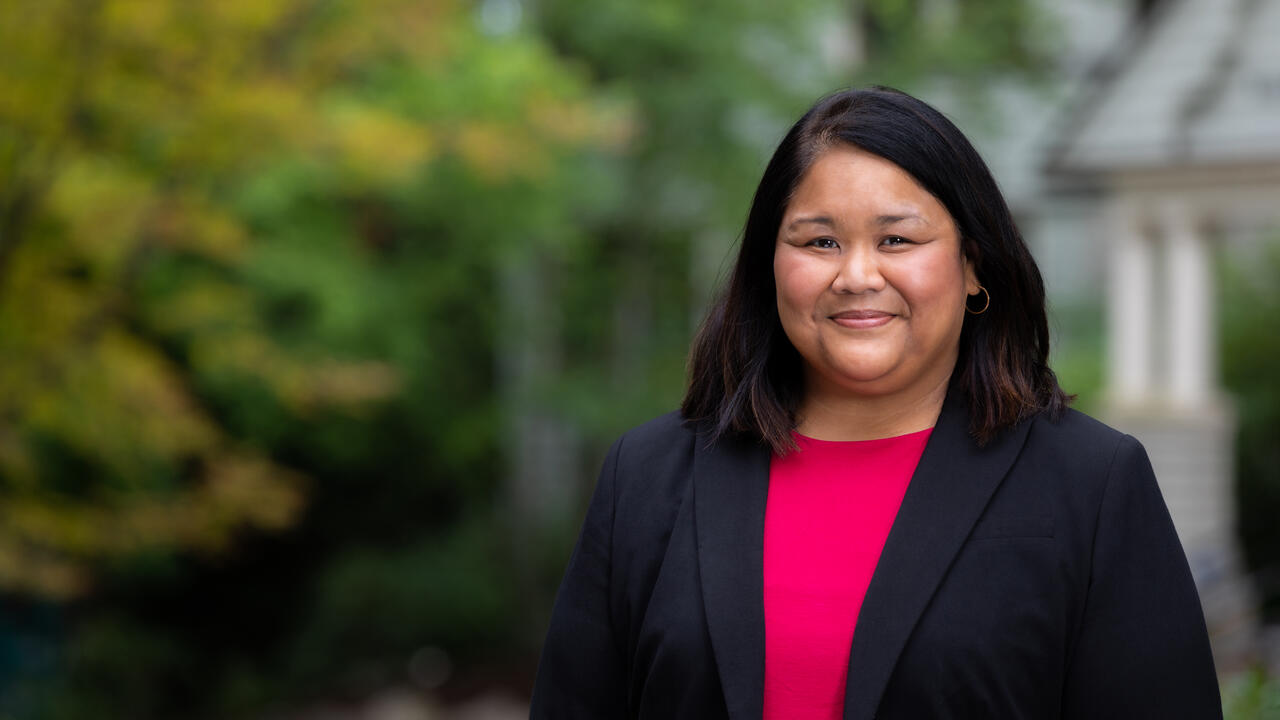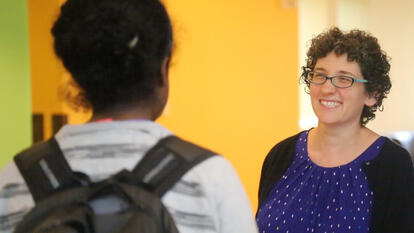
Wellesley’s New Dean of Admission and Financial Aid
When Theresa “Peaches” Valdes started as dean of admission and financial aid at Wellesley in August, one of the first items she put in her office in Weaver House was the owl lantern she received as a Bryn Mawr first-year.
“Women’s colleges have great traditions. If I go to another Mawrter’s home or office and see the lantern, I know, OK, we’re going to connect,” Valdes says. She feels similarly connected to Wellesley, which is a big reason she decided to come to the College from Hamilton, where she had been dean of admission since 2017.
“When I thought about where my next step would be, I thought about what felt like home. And to me, the Seven Sisters (now Siblings) felt like home,” says Valdes. “What I’ve appreciated about the Sisters is that we were ahead of the curve in terms of how we recognize and celebrate diversity. We were founded to create access to something that was denied. There is a deep commitment to provide an opportunity for all women—cisgendered, non-binary, and trans—to be in a space where their voices are heard. That idea really resonated.”
When Valdes learned more about Wellesley in particular, what really stood out was its dedication to inclusive excellence. “The fact that this overarching theme and appreciation for inclusion is incorporated into all facets of the Wellesley experience gives great insight into the College’s values. Yes, you may think it’s radical, but this is reality, and this is what the world needs,” she says.
“The fact that this overarching theme and appreciation for inclusion is incorporated into all facets of the Wellesley experience gives great insight into the College’s values. Yes, you may think it’s radical, but this is reality, and this is what the world needs.”
Theresa “Peaches” Valdes, dean of admission and financial aid
In high school in rural Pennsylvania, Valdes thought she wanted to be at a big Division I university. “I wasn’t an athlete. But the idea of community—I think that was the big thing, community. … Everybody goes to the game and everybody celebrates the institution that way,” she says. But her older sister went to Bryn Mawr and thought it would be a good fit for Valdes. Reluctantly, she went on a tour—and found that sense of community she was longing for.
Valdes majored in political science and worked in the admission office as a tour guide. “I loved my experience at Bryn Mawr. I wanted to be able to share it with families,” she says. In college, her goal was to work at the United Nations: “Like many young activists, I wanted to change the world.” She thinks advocacy was always in her heart. “I think a lot of it stemmed from the fact that my parents immigrated to the U.S. [from the Philippines]. As a young person, you can see the obstacles your family faces, when they’re coming to a new country [and] English is not their primary language,” she says.
She went to law school, but left after two years. She had thought that as a lawyer, she’d have a voice. “And then I realized, there are other ways to have a voice and to be an advocate for others,” she says. Her mentors at Bryn Mawr suggested she pursue the college’s master of law and social policy program as a way to combine her interests. She took their advice, and also returned to the admission office part-time. After she completed her master’s, she considered moving to Washington, D.C.—but a temporary position opened in the admission office. And the rest is history.
Valdes stayed at Bryn Mawr for almost 17 years, working her way up the admissions ladder. Along the way, she says, she learned to look at the big picture: “How do we build and shape a class? How do we reflect our mission statement? How do we reflect the world around us? What do we want to say? How do we want to recruit students, and what do we want to say to them about who we are as an institution?”
In the decades Valdes has worked in admissions, the way schools use data to help drive their admission decisions has changed significantly. “Sometimes people think data’s cold, and data lacks humanity,” she says. “However, there’s data with a soul. It’s about using data to create access. How can you be more equitable in your process?”
Valdes’ five years at Hamilton “corrected a lot of myths that I had about coed institutions, and it was such an amazing experience,” she says. But the pull to return to a women’s college, and specifically Wellesley, was strong. For students, Wellesley “opens so many doors. It’s not just about a transformational education. It's about the amazing network. Wellesley graduates pay it forward; they pave the way and open doors for others—scholars, scientists, artists, and activists. To me, these acts truly embody the spirit of the College's motto of ‘Not to be ministered unto, but to minister.’ And I am excited to be a part of the community.”



